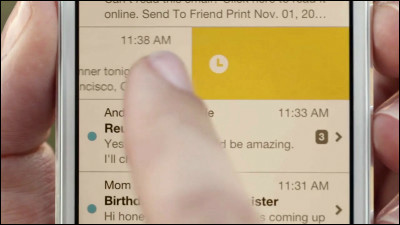Life hack for those who are not diagnosed with ADHD but feel inattentive

Many people have experienced their own lack of attention, such as being late for an appointment or breaking a deadline that they promised never to break again. Rob Rosenthal, a psychologist at the University of Colorado, has put together strategies to help people with attention deficits, whether they have a formal diagnosis of ADHD or not.
These strategies and life hacks can help anyone with ADHD, as well as those who struggle with attention problems but don't have a diagnosis
◆ Organizing and prioritizing
First, Rosenthal points out, ``Recording important activities with a simple organization system can improve your concentration.'' Regarding the recording method, he said, “The ideal is to focus on one tool, such as a notebook or smartphone app. Developing a routine that includes filling out calendar appointments is fundamental to developing focus and a sense of control.'
When using a to-do list, it's important to break down your tasks into smaller pieces and prioritize them. It's hard to decide what to prioritize, but one way is the ' Eisenhower Matrix '. This divides the task into four categories, ``important and urgent'', ``important but not urgent'', ``not important but urgent'', ``not important nor urgent'', and divides each into the following quadrants, upper left → upper right → Lower left → Lower right is processed in order.

Rosenthal says many people with ADHD first try to fulfill 'urgent but unimportant' tasks, such as responding to other people's needs, because the urgency of others seems more important than their own needs. It is said that it is the body. It's also because doing something for someone immediately makes you feel positive and relieves you of a stressful job.
The Eisenhower Matrix prioritizes “most important” rather than “instant gratification” as above.
◆ Organizing the environment
After making a plan, there are also several strategies for following through with the plan. The key is to create an environment conducive to productivity. That means limiting distractions and setting up barriers to prevent temptation. Ideally, you should use
Not only is it stressful at the last minute, but it also affects other priorities and basics like eating and sleeping. Therefore, Mr. Rosenthal introduces a method called ' distractivity delay ' that keeps concentration on unpleasant tasks. First, decide how long you can stay focused, say 25 minutes of work, 5 minutes of rest, then set a timer and repeat.
While you are doing this, it is conceivable that other irrelevant tasks may come upon you, but when that happens, make a note of it in a notebook, etc., and return to the task in front of you thinking, 'I can do it later.' is important. When you enter the break time, look at the memo, check if it needs to be executed immediately, and finish it quickly during the break time or add it to the ToDo list as a new task.

◆Support from surroundings
In order to continue working, it is essential to have a support system to hold yourself accountable and encourage you. This includes friends and family, therapists, group therapy, and online forums for sharing goals and receiving feedback.
As another effective support method, Mr. Rosenthal introduces ' body doubling '. This means working in front of people you know and family, physically or virtually. You can do the same job together, or you can do the work and the other person just listens to their favorite music. It is hoped that this will improve concentration and reduce anxiety.
◆ sleep
According to Rosenthal, people with ADHD have trouble getting to bed at set times and often have trouble falling asleep. A growing body of evidence suggests that irregular sleep can perpetuate cycles of inattentiveness.
“Sticking to bedtime and waking up at the same time every day is part of a good sleep strategy,” says Rosenthal. And don't take a nap eight hours before bedtime,' he said, emphasizing the importance of sleep cycles.
Also, it is important to learn how to relax before going to bed. 'It's normal to take longer to fall asleep, but if you can't fall asleep after 45 minutes, get out of bed and do some relaxing activities until you're sleepy again,' says Rosenthal. Looking at the clock is not helpful for falling asleep.
Finally, Rosenthal says, ``When incorporating these strategies, start with what is most familiar to you. Living a routine is worth it, and you may find that instead of trying to get things done last minute, you can take your time and be proud of what you've done.' said.
Related Posts:
in Posted by log1p_kr







